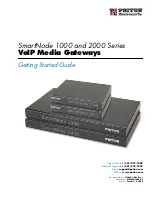
BB2-7030 User Guide – Rev. 1.0
Page 26
8.
Configuring
the
BB2
7030
01
as
a
Modbus
TCP
Server
The term “server” is often used to describe the Modbus TCP version of a Modbus slave. A server
will provide data when a client asks for it. The concept of master/slave is less significant in
Modbus TCP because any TCP device can be both master and slave at the same time, and there
can be multiple “masters” on the network. That is in contrast with Modbus RTU where there can
be only one master and multiple slaves, and each device must be one or the other.
The Modbus TCP server is simply a collection of registers that may contain data. The source of
that data in the case of Babel Buster BB2-7030 can be any of several possible sources. It may be
read from another Modbus device. Another Modbus device could have put it there by writing to
the BB2-7030. The BACnet client could have read the data from another BACnet device.
Another BACnet device could have put it there by writing to the BB2-7030.
The collection of Modbus registers in the BB2-7030 are actually a collection of BACnet objects
that happen to have Modbus addresses as aliases.
Modbus register numbers for accessing data objects in the BB2-7030 are calculated. The register
number for binary and multi-state objects is R=T*1000+I where T is the BACnet Object Type,
and I is the instance (R is the resulting register number). The register number for analog objects,
because they must be read as a register pair, is R=T*1000+I*2-1 (R is the first register number in
the pair). Register numbers start at 1. To create a raw address, subtract 1 from the register
number.
Analog objects should be read as input registers or holding registers, and can only be written as
holding registers. Binary and multi-state objects can be read as any register type (coil, discrete,
input register, holding register), and can be written as coil or holding register.
Analog objects are always floating point data read as a register pair with most significant register
first unless the Swap box is checked on the Modbus page in the configuration tool. Attempting to
read or write an Analog object as a single register will produce an error.
Object types that may be used in Modbus register number calculation are:
0 – Analog Input
1 – Analog Output
2 – Analog Value
3 – Binary Input
4 – Binary Output
5 – Binary Value
13 – Multistate Input
14 – Multistate Output
19 – Multistate Value
















































